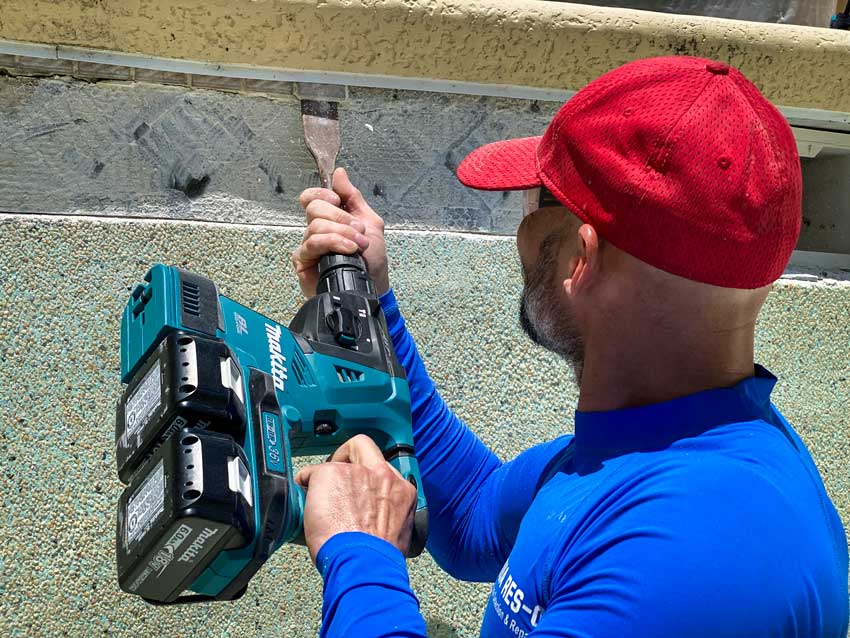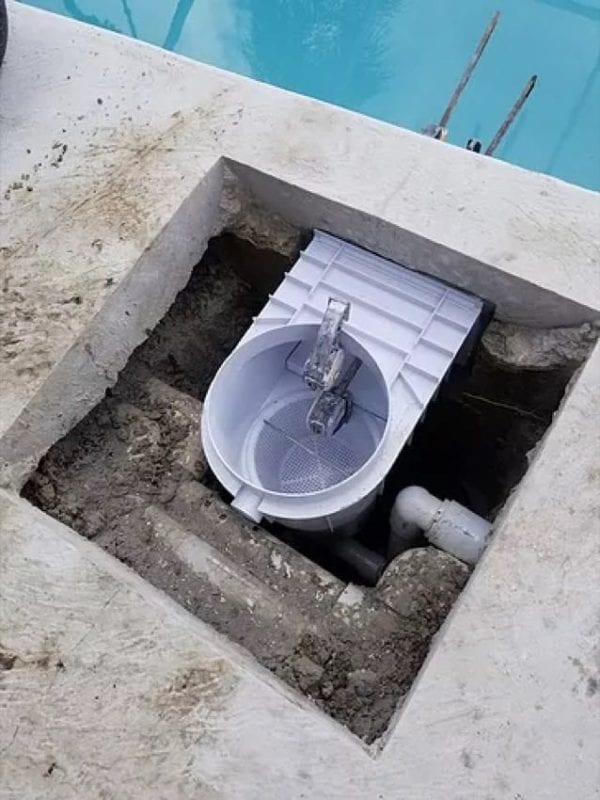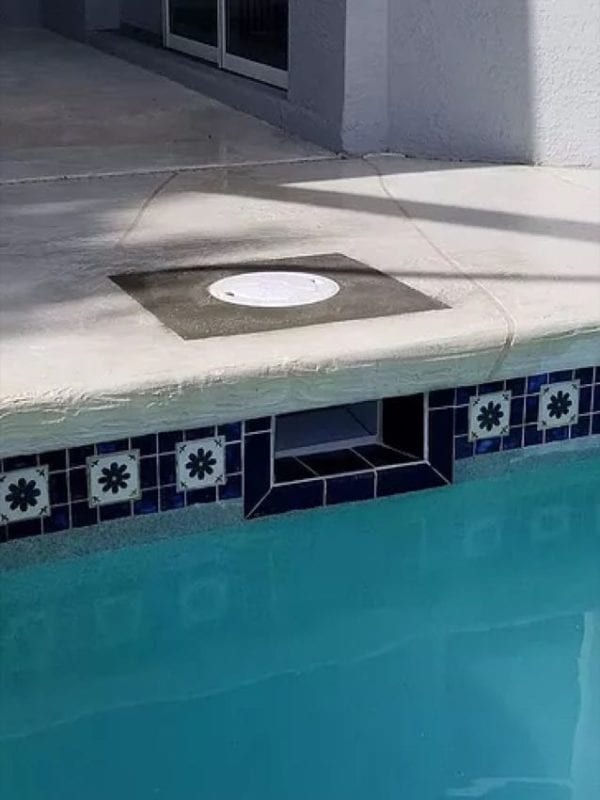The pool at my home had a major leak—losing around an inch of water per day. As I’m not well-versed in leak detection, I called up Aqua Res-Q who specializes in this kind of work. The guys at Aqua Res-Q showed up and located the problem after a few hours of fairly extensive troubleshooting. When it came time to start fixing the leak, they pulled out a corded Makita rotary hammer. Now, I’m no expert, but pools have water. Corded tools and water don’t mix. I wondered if the Makita XRH08 1-1/8 in. 18V X2 SDS-Plus rotary hammer could replace their corded Makita HR2811F—and let them work more safely in the process.
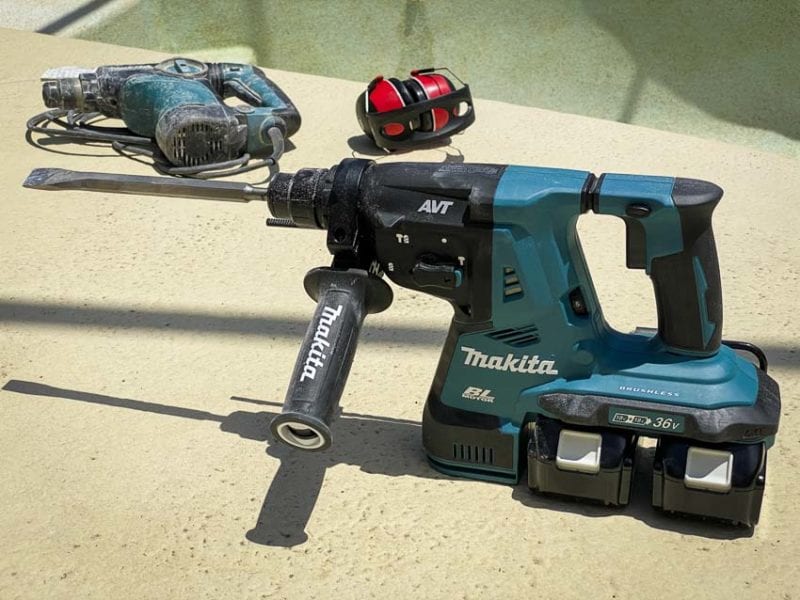
The Pool Job
I quickly asked Nick from Aqua Res-Q if he wanted to help us review the Makita XRH08, the cordless version of his 1-1/8 in. SDS-Plus rotary hammer. He loved the idea and was excited to try it out on some swimming pool leak repair jobs. Two weeks later we got together and I handed off the tool, batteries, bits, and a dual-battery Rapid charger.
Any number of scenarios can cause a pool leak. I learned a lot hanging with Nick and his twin brother from Aqua Res-Q. On my pool, the pipes all checked out. The leak turned out to be within the two water returns at the bottom of the pool.
The solution? Hydraulic cement. Lots of it. Pros use hydraulic cement, among other things, in drainage. They put massive concrete pipes into the ground and use the cement to seal one pipe to the other.
After completely draining the poll, they used their Makita corded rotary hammer to chip completely around the return drains. Creating a circle roughly 3-4 inches larger in diameter than the plastic return itself, they poured in the hydraulic cement. It dries extremely quickly and it’s not porous so it holds or seals against water. The Makita XRH08 looked like it might have helped.
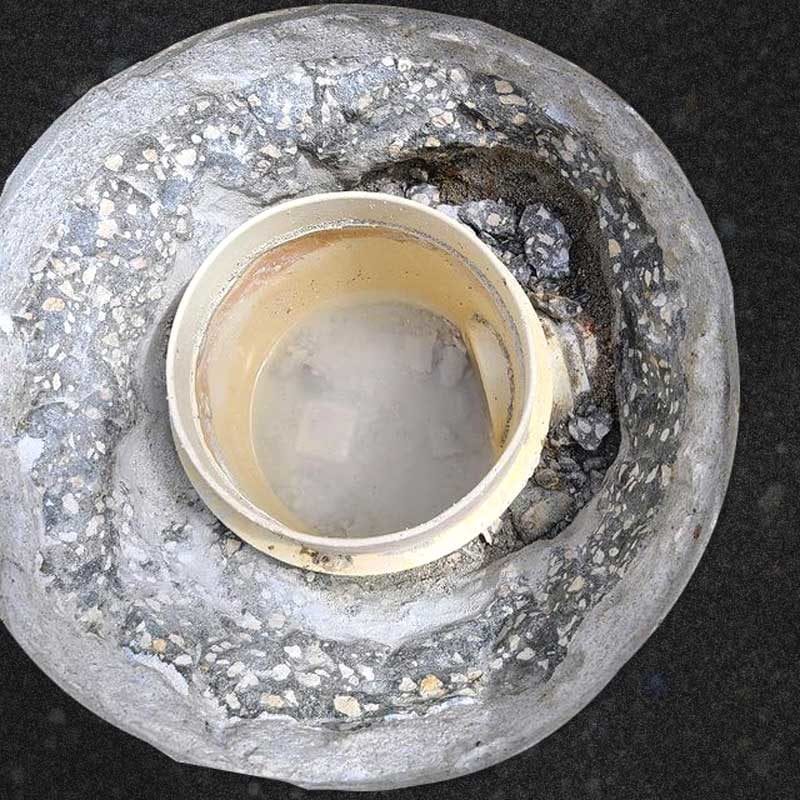
The new concrete formed a waterproof seal around the plastic returns which stopped the leak. In my case, the size of the leak required quite a bit of cement and two rather large holes.
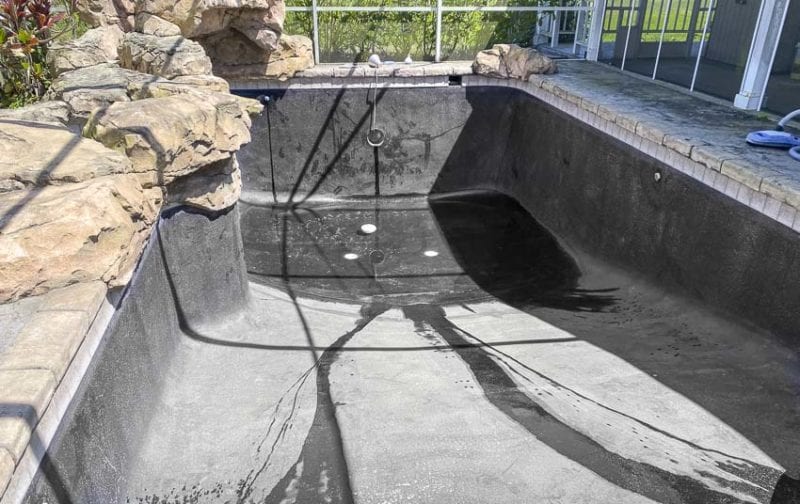
Of course, I wanted to know how the cordless version of this tool would perform. However, with my job completed well before the Makita XRH08PT kit arrived, I needed to wait for another job.
Testing the Makita XRH08 1-1/8 in. 18V X2 SDS-Plus Rotary Hammer
I finally got my chance to see the Makita XRH08 in action a couple of weeks later. With pool leak detection you also frequently find yourself replacing pool tile. While you don’t typically find leaks under the tile itself, you do find leaks near the tile. They show up around and within light niches, skimmer baskets, and similar areas.
When you find a leak around a skimmer basket, you typically have to replace the tile surround. This often precedes a request from the homeowner to go ahead and replace all of the tiles on a pool. Such was the case at this job.
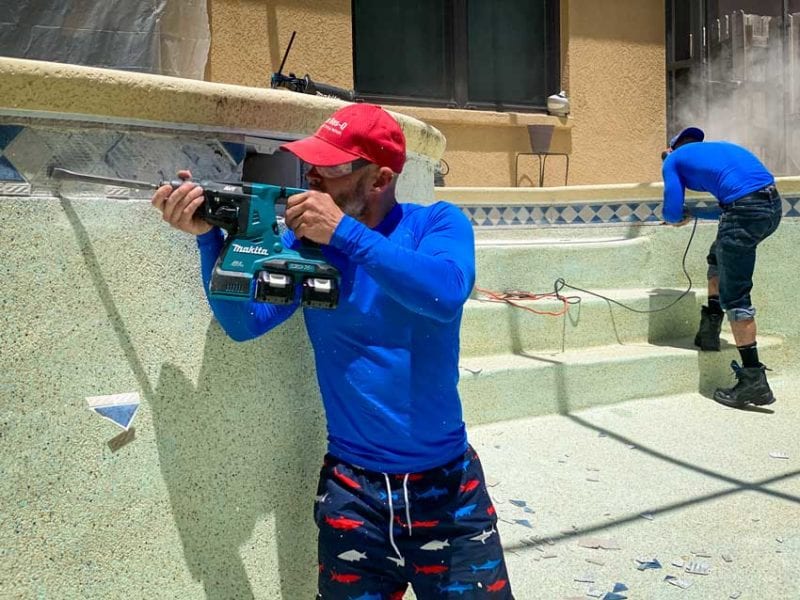
The guys at Aqua Res-Q took to the tile with both tools. It was a race from the stairs to see who could make it all the way around the perimeter. The Makita XRH08 dominated the race, chipping with a lot more authority and precision. However, that task wasn’t a sufficient test for a tool with its capabilities. For that, we’d need to interview the guys about using the tool when chipping through a lot more concrete.
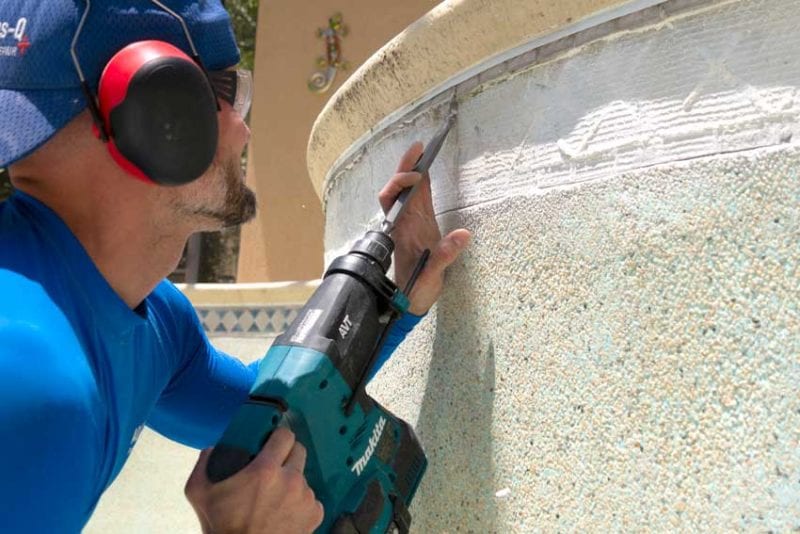
2 More Weeks of Using the Makita XRH08 Rotary Hammer
Lots of opportunities exist for a rotary hammer when it comes to pool leak repair. When a skimmer leaks, you have to remove it from the top deck. Removing tile, like above, is a common theme. You need to break open the concrete pool floor to fix those drains (as in my case) or do the same in the wall to repair a light niche. You can even find yourself chipping out a series of return water supplies to repair those fittings if needed.
A cordless rotary hammer like the Makita XRH08 really proves helpful when dealing with scenarios where the pool doesn’t necessarily need to be emptied entirely.
The guys used the Makita XRH08 to cut a large square around a skimmer to replace it. In doing so, they used the Makita for roughly 35-40 minutes. Surprisingly for them, this only took the batteries down to around 2 bars. In some applications, and with another pair of batteries and a dual Rapid charger, you can pretty much use this tool all day long.
The tool hit harder than the corded HR2811F, an observation that holds up under scrutiny. The corded Makita hits with 2.9 Joules of energy. The cordless XRH08 punches with 3.2 Joules. That’s 10.3% more energy on the cordless tool.
However, the XRH08 also weighs an additional 3 pounds. After a while, that additional weight takes its toll. This proved particularly true when holding the tool up to chip out light niches at roughly chest level. Switching to the corded tool provided some relief.
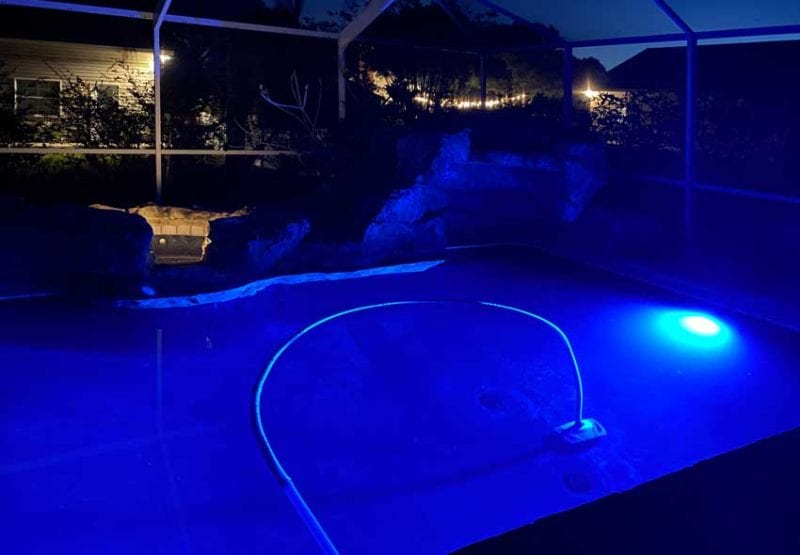
Additional Thoughts in Using the Makita XRH08 Rotary Hammer
The Makita XRH08 rotary hammer provides very consistent power. Nick liked using it with a Makita D-51150 3/4 x 10-in. cold chisel SDS-Plus bit. These bits chew through concrete quickly when they have a good edge. You can also resharpen them easily.
He really experienced a drop in power and hammering capability when switching back to the corded 1-1/8 in. rotary hammer. Nick commented that he really liked the high-velocity speed the cordless model delivers for chipping tasks.
Another interesting observation involves heat. The body on the corded Makita HR2811F rotary hammer gets so hot, he has to use gloves after extended use. The 18V X2 Makita XRH08 maintains a much cooler operating temperature—even after 30-45 minutes of near-constant chipping.
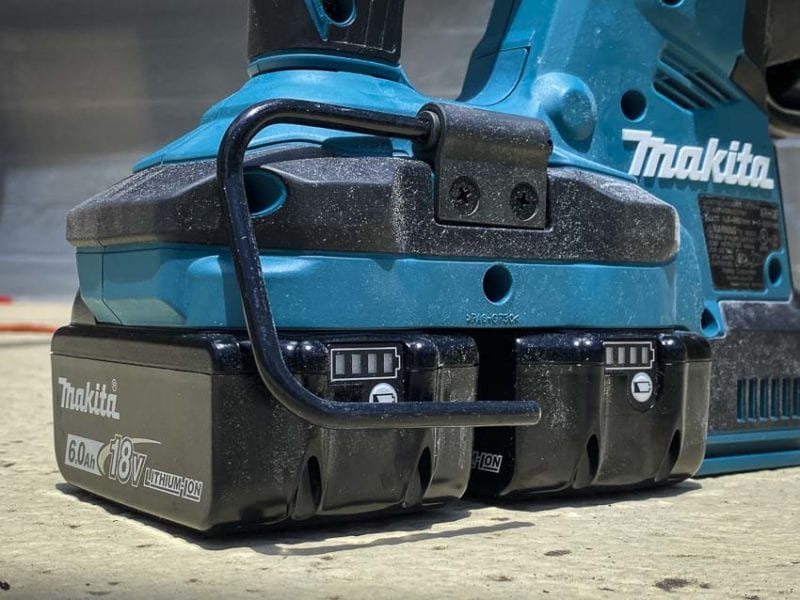
At 10.8 lbs vs 7.7 lbs, the additional weight of those batteries is significant. It’s most noticeable when you need to hold the tool in the air. To put this in perspective, cutting out a ~3-inch diameter around a light niche involves chipping through a good 8-10 inches of the pool shell. It takes about 2 to 2-1/2 hours to complete.
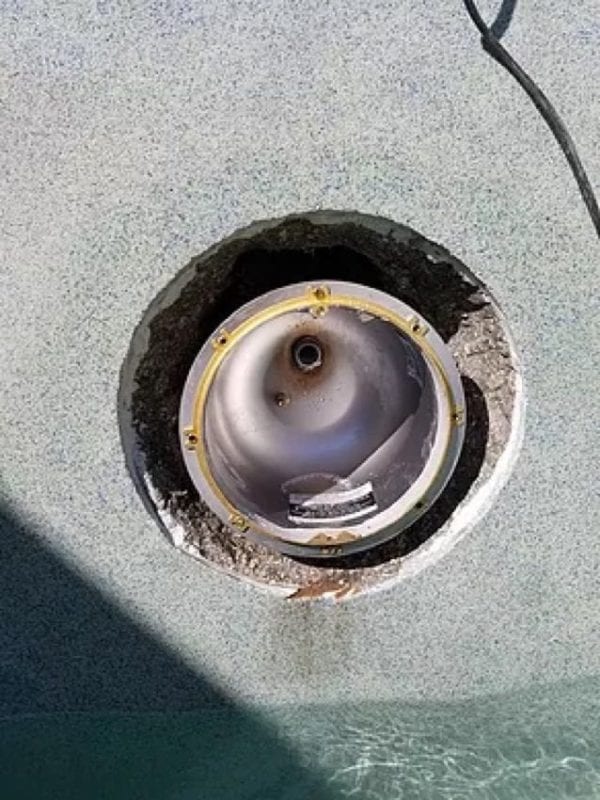
Makita XRH08PT Features
This 1-1/8 inch cordless SDS-Plus rotary hammer has everything you’d expect in a mid-sized tool. You get a speed dial to configure your maximum speed. That works alongside the variable-speed trigger. With Makita AVT (anti-vibration technology) the tool does more of the work without wrecking your hands and wrists in the process.
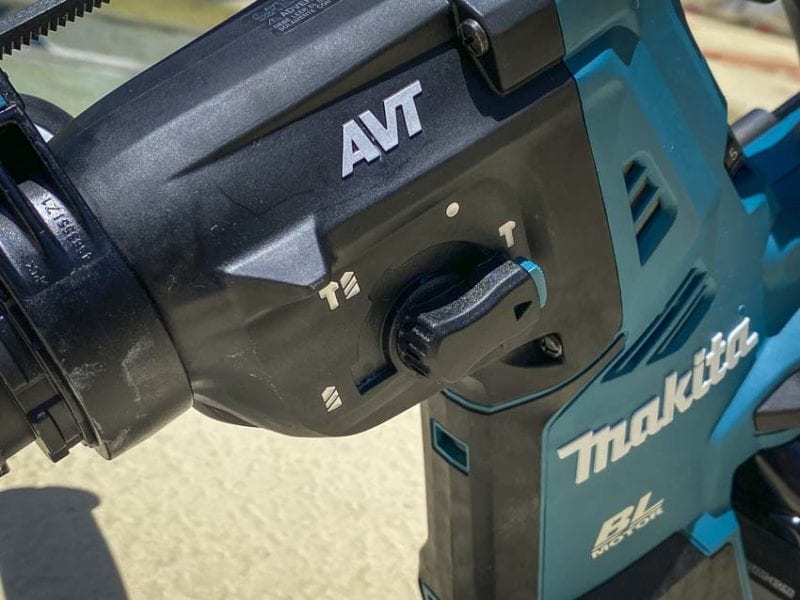
You get rotation-only mode as well as rotary hammer and chipping-only modes. A torque limiting clutch protects you by preventing gear (and arm) damage by automatically disengaging gears if the bit binds. This helps when drilling into concrete that might contain rebar. Beyond this, the Makita XRH08 includes a ton of other features:
- Drill up to 140 1/2″ x 2-3/8″ holes per charge (w/two 5.0Ah batteries)
- Impact energy: 3.2 J
- Brushless motor
- Speed: 0-980/5,000 BPM
- Energy: 2.3 ft-lbs.
- Optional OSHA Table 1 compliant On-Board Dust Extractor Attachment
- Vibration-absorbing back and side handles
- Electric brake
- Built-in LED light with independent on/off
- Large 2-finger trigger
- Retractable tool hook
- Rapid Optimum Charger (kit)
- 3-year limited warranty on tool, battery and charger
- Price: $609 (kit)
Conclusion
What this really came down to was a test of corded vs cordless Makita 1-1/8″ rotary hammers. In the end, Nick and his brother reach for the cordless XRH08 anytime they find themselves standing in or near water. That tool definitely has more power than its corded equivalent. It simply gets work done more quickly—and without overheating in the process. While it weighs more—it hits harder. That trade-off should be worth it to many people looking for a hard-hitting cordless rotary hammer.
At $609 for the kit, this tool should appeal to anyone wanting to gain cordless freedom in a 1-1/8″ rotary hammer without sacrificing power. The AVT vibration control and power make it a great Pro-level tool purchase for professional-level work.
Thanks to Aqua Res-Q for checking out this tool and giving us their valuable feedback. If you live in Central Florida and suspect you might have a pool leak, give them a call.

